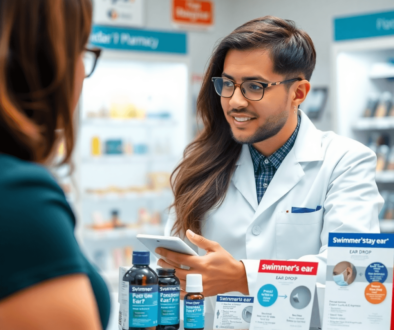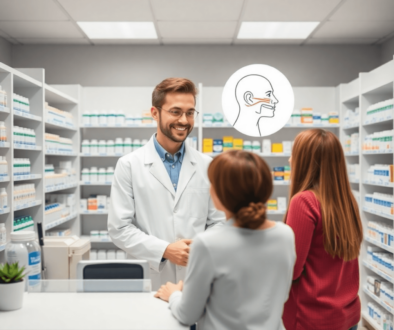Unlocking the Secrets of Your Local Pharmacy: 10 Essential Tips for Smarter Medication Management
Navigating the world of prescriptions can often feel overwhelming, leaving many people unsure of how to effectively manage their medications. Your local pharmacy is more than just a stop for filling prescriptions; it’s a treasure trove of knowledge and support that can transform the way you handle your health. In this article, we’ll uncover 10 essential tips for smarter medication management that will empower you to take charge of your wellness journey. From understanding dosage schedules to leveraging pharmacist expertise, these insights will help you navigate your medications with confidence. Whether you’re managing chronic conditions or simply looking to optimize your health routine, unlocking these secrets will ensure you maximize the benefits of your medications while minimizing potential risks. Let’s dive in and discover how to effectively partner with your local pharmacy for a healthier, more informed you!
10 Essential Tips for Smarter Medication Management
1-Unlocking the Secrets of Your Local Pharmacy:
Navigating the world of prescriptions can often feel overwhelming, leaving many people unsure of how to effectively manage their medications. Your local pharmacy is more than just a stop for filling prescriptions; it’s a treasure trove of knowledge and support that can transform the way you handle your health. In this article, we’ll uncover 10 essential tips for smarter medication management that will empower you to take charge of your wellness journey. From understanding dosage schedules to leveraging pharmacist expertise, these insights will help you navigate your medications with confidence. Whether you’re managing chronic conditions or simply looking to optimize your health routine, unlocking these secrets will ensure you maximize the benefits of your medications while minimizing potential risks. Let’s dive in and discover how to effectively partner with your local pharmacy for a healthier, more informed you!
2-Understanding Your Local Pharmacy’s Role in Healthcare
Your local pharmacy plays a crucial role in the healthcare system, serving as a bridge between you and your healthcare providers. Pharmacists are highly trained professionals who possess extensive knowledge about medications, their uses, and potential side effects. They are equipped to provide personalized advice and support tailored to your specific health needs, making them an invaluable resource in your medication management journey.
Beyond dispensing medications, pharmacies offer a wide range of health services, including vaccinations, health screenings, and wellness consultations. Many pharmacies now offer medication therapy management (MTM) services, where pharmacists work closely with patients to optimize their medication regimens, ensuring they achieve the best possible outcomes. By understanding the breadth of services available at your local pharmacy, you can take full advantage of the support they offer.
Pharmacists also play a vital role in patient education, helping you understand how to take your medications correctly, what to expect in terms of effects and side effects, and how to manage any potential interactions with other medications or supplements you may be taking. By fostering a strong relationship with your pharmacist, you can gain a deeper understanding of your medications and how they fit into your overall health plan.
3-The Importance of Medication Management
Effective medication management is essential for ensuring that you get the maximum benefit from your treatments while minimizing any potential risks. Poor medication management can lead to missed doses, incorrect usage, and adverse reactions, all of which can negatively impact your health. By taking a proactive approach to managing your medications, you can improve your health outcomes and enhance your overall quality of life.
One of the key aspects of medication management is adherence, which refers to taking your medications exactly as prescribed by your healthcare provider. Adherence can be challenging for various reasons, including complex dosing schedules, side effects, and forgetfulness. However, by implementing strategies such as setting reminders, using pill organizers, and enlisting the help of your pharmacist, you can stay on track with your medication regimen.
Another important component of medication management is monitoring for potential drug interactions and side effects. This involves keeping a comprehensive list of all the medications you are taking, including over-the-counter drugs and supplements, and regularly reviewing this list with your pharmacist. By staying vigilant and informed, you can quickly identify and address any issues that may arise, ensuring your medications work as intended.
4-How to Build a Relationship with Your Pharmacist
Building a strong relationship with your pharmacist is one of the most effective ways to optimize your medication management. Pharmacists are accessible healthcare professionals who can provide valuable insights and support tailored to your individual needs. By establishing open lines of communication, you can ensure that you receive the best possible care and guidance.
Start by introducing yourself to your pharmacist and sharing relevant information about your health conditions, medications, and any concerns you may have. This will help your pharmacist gain a better understanding of your unique situation and enable them to provide more personalized advice. Don’t hesitate to ask questions or seek clarification on any aspect of your medication regimen; your pharmacist is there to help.
Regularly update your pharmacist on any changes to your health status or medication regimen, including new prescriptions, over-the-counter drugs, and supplements. This will allow your pharmacist to monitor for potential interactions and make any necessary adjustments to your treatment plan. By maintaining open and honest communication, you can foster a collaborative relationship that supports your overall health and well-being.
5-Tips for Organizing Your Medications
Keeping your medications organized is a crucial aspect of effective medication management. A well-organized system can help you stay on track with your dosing schedule, reduce the risk of missed doses or double dosing, and ensure that you always have your medications on hand when you need them.
One of the most effective ways to organize your medications is by using a pill organizer. These handy tools come in various sizes and configurations, allowing you to sort your medications by day and time. Pill organizers can be especially helpful for individuals with complex medication regimens, as they provide a clear visual reminder of when each dose needs to be taken.
In addition to using a pill organizer, consider setting up a medication station in your home. Choose a designated spot, such as a kitchen counter or bedside table, where you can store your medications, pill organizer, and any relevant information (e.g., medication lists, dosing schedules, and contact information for your healthcare providers). By keeping everything in one place, you can streamline your medication routine and reduce the likelihood of errors.
6-Knowing Your Medications: Names, Uses, and Side Effects
Understanding the medications you are taking is essential for effective medication management. This includes knowing the names of your medications, their intended uses, and potential side effects. By familiarizing yourself with this information, you can better manage your health and make informed decisions about your treatment.
Start by creating a comprehensive list of all the medications you are taking, including prescription drugs, over-the-counter medications, and supplements. For each medication, note its name (both brand and generic), dosage, frequency, and the condition it is intended to treat. Keep this list updated and share it with your healthcare providers and pharmacist during appointments.
In addition to knowing the names and uses of your medications, it’s important to be aware of potential side effects. Some side effects may be mild and manageable, while others may require medical attention. Your pharmacist can provide detailed information about potential side effects and advise you on how to manage them. By staying informed, you can quickly identify any adverse reactions and take appropriate action to address them.
7-The Benefits of Medication Synchronization
Medication synchronization, or med sync, is a service offered by some pharmacies like MisterPharmacist that can simplify your medication management and improve adherence. Med sync involves coordinating the refill dates of your prescriptions so that you can pick up all your medications at the same time each month. This can save you time, reduce the number of trips to the pharmacy, and help ensure that you always have your medications on hand.
To take advantage of medication synchronization, speak with your pharmacist about enrolling in the program. They will work with you to align your refill dates and create a schedule that fits your needs. In addition to convenience, med sync can also provide an opportunity for regular check-ins with your pharmacist, allowing them to monitor your progress and make any necessary adjustments to your treatment plan.
Medication synchronization can be particularly beneficial for individuals with multiple chronic conditions who are taking several medications. By streamlining the refill process, you can reduce the risk of missed doses and improve overall adherence to your medication regimen. This, in turn, can lead to better health outcomes and a more manageable medication routine.
8-Utilizing Pharmacy Services for Better Health
Your local pharmacy offers a variety of services that can support your overall health and wellness. In addition to filling prescriptions, many pharmacies provide health screenings, vaccinations, and wellness consultations. By taking advantage of these services, you can proactively manage your health and catch potential issues before they become more serious.
Health screenings available at pharmacies may include blood pressure checks, cholesterol testing, and diabetes screenings. These screenings can provide valuable insights into your health and help you identify any risk factors that may need to be addressed. If a screening reveals an area of concern, your pharmacist can provide guidance on next steps and refer you to a healthcare provider if necessary.
Vaccinations are another important service offered by many pharmacies. Pharmacists are trained to administer a variety of vaccines, including those for flu, pneumonia, shingles, and more. Staying up-to-date on your vaccinations is crucial for preventing illness and maintaining your overall health. By receiving your vaccinations at your local pharmacy, you can enjoy the convenience of a one-stop shop for your healthcare needs.
9-How to Navigate Insurance and Prescription Costs
Managing the cost of medications can be a significant challenge for many individuals. Understanding your insurance coverage and exploring cost-saving options can help you manage expenses and ensure that you can afford the medications you need. Your pharmacist can be a valuable resource in navigating insurance and prescription costs.
Start by reviewing your insurance plan’s formulary, which is a list of covered medications. This can help you determine which medications are covered and at what cost. If you have questions about your coverage or encounter any issues, your pharmacist can assist you in understanding your benefits and advocating on your behalf.
If your medication is not covered or is too expensive, speak with your pharmacist about alternative options. They may be able to suggest a lower-cost generic version or a therapeutic alternative that is covered by your insurance. Additionally, many pharmacies offer discount programs or savings cards that can help reduce out-of-pocket costs. By exploring these options, you can find ways to manage your prescription expenses without compromising your health.
10-Staying Informed: Resources for Medication Safety
Staying informed about medication safety is crucial for effective medication management. There are numerous resources available to help you stay up-to-date on the latest information and best practices for managing your medications. By leveraging these resources, you can make informed decisions and ensure that your medication regimen is safe and effective.
Online resources such as the FDA’s or Health Canada medication safety website and the National Institutes of Health’s MedlinePlus offer comprehensive information about medications, including their uses, side effects, and potential interactions. These websites also provide guidance on safe medication practices and tips for managing your medications effectively. Bookmark these resources and refer to them regularly to stay informed.
In addition to online resources, consider joining a support group or community organization focused on medication management. These groups can provide valuable peer support and access to educational materials and events. By connecting with others who are also managing their medications, you can share experiences, learn from one another, and gain additional insights into effective medication management.
Conclusion: Empowering Yourself for Better Medication Management
Taking charge of your medication management is a vital step in ensuring your overall health and well-being. By unlocking the secrets of your local pharmacy and implementing the tips outlined in this article, you can navigate your medications with confidence and optimize your health outcomes. From building a strong relationship with your pharmacist to staying informed about medication safety, these strategies will empower you to take control of your wellness journey.
Remember, your local pharmacy is more than just a place to fill prescriptions; it’s a valuable partner in your healthcare journey. By leveraging the expertise and services offered by your pharmacy, you can enhance your medication management, improve adherence, and achieve better health outcomes. Don’t hesitate to reach out to your pharmacist with questions or concerns – they are there to support you every step of the way.
Empower yourself with knowledge, stay organized, and maintain open communication with your healthcare providers. By taking a proactive approach to medication management, you can ensure that you are getting the most benefit from your treatments while minimizing potential risks. Your health is your most important asset, and by unlocking the secrets of your local pharmacy, you can take charge of your wellness and live a healthier, more informed life.



